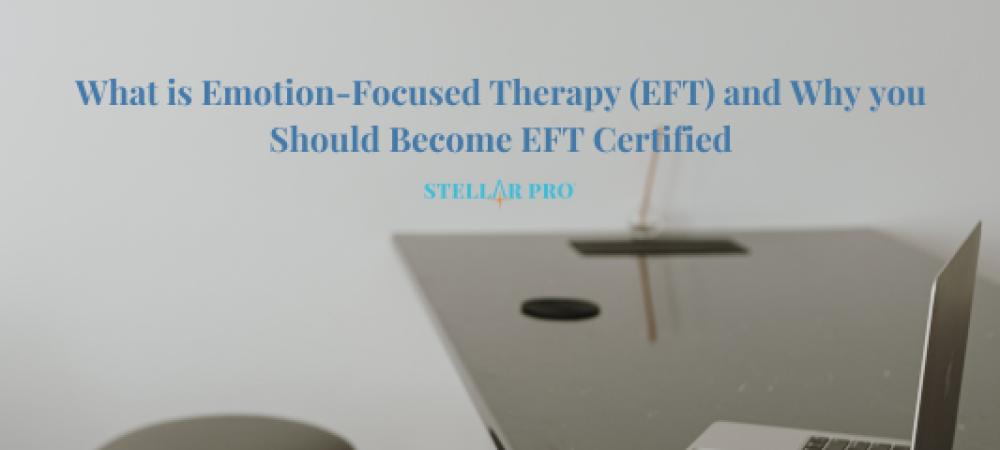Emotion-Focused Therapy (EFT) is an evidence-based approach to helping individuals and couples effectively manage their emotions. It is one of the most widely used therapeutic approaches today and it is highly effective in treating a range of challenging issues.
For mental health professionals, becoming EFT certified is one way to broaden the scope of services you offer your clients and reach more people with EFT’s powerful tools. In this blog post, we will explore what EFT is, how it works, who it’s for, and why mental health professionals should become EFT certified in order to offer the best possible care for their clients.
What is Emotion-Focused Therapy (EFT)?
Emotion-Focused Therapy (EFT) is a form of therapy that focuses on emotions and how they can be used to facilitate positive change in individuals. There are two primary types of EFT: Process-Experiential Therapy (PE) and Emotionally Focused Therapy (EFT). PE is aimed at helping individuals to identify and express their emotions in a healthy way, while EFT focuses on improving interpersonal relationships by helping individuals to express emotions within the context of the relationship. Both types of EFT have been found to be effective in treating a variety of emotional and psychological issues, including depression, anxiety, trauma, and other relationship problems.
EFT works by helping individuals to identify and understand their emotions in a more comprehensive way. According to Leslie Greenberg, the creator of EFT, emotions are seen as a guide to help individuals navigate through their experiences. By recognizing and working with emotions, individuals can achieve a more balanced and fulfilling life.
EFT can be used by anyone who wants to gain a better understanding of their emotions and improve their relationships with others. This includes individuals who are struggling with mental health issues and couples who want to improve their relationship dynamics.
If you are a mental health professional, getting certified in EFT can be a great way to enhance your therapeutic skills and support your clients. According to the International Society for Emotion-Focused Therapy (ISEFT), certification in EFT is recognized worldwide as a mark of excellence in the field. Becoming EFT certified can also enhance your career opportunities and professional reputation.
How does EFT work?
EFT works by helping individuals become more aware of and accepting of their emotions, so they can understand how those emotions may be influencing their thoughts and behaviors. EFT also teaches individuals to use their emotions to guide their actions, rather than trying to suppress or ignore them.
Through EFT, individuals learn to identify and express their emotions in a safe and supportive environment. This can be especially helpful for clients who struggle with expressing themselves or have difficulty understanding their emotions. EFT uses a variety of techniques such as empathic listening, emotion-focused exploration, and experiential processing. By exploring these emotions with the help of a trained therapist, clients can gain insight into their behavior patterns and learn effective ways to manage their emotions.
EFT is suitable for individuals, couples, and families who struggle with a range of emotional difficulties, including depression, anxiety, trauma, relationship issues, and self-esteem issues. It is especially effective for clients who have difficulty expressing themselves verbally or who have experienced emotional disconnection in their relationships.
Who is EFT for?
Emotion-Focused Therapy (EFT) is a form of psychotherapy that focuses on exploring and processing emotions for improving psychological and relational well-being. This approach is particularly useful for individuals struggling with emotional disturbances, such as anxiety, depression, trauma, and relationship difficulties.
EFT is suitable for various populations, including individuals, couples, families, and groups, experiencing emotional dysregulation, limited emotional expression, lack of emotional awareness, or attachment-related issues.
According to EFT expert Dr. Sue Johnson, EFT is particularly helpful for people struggling with a sense of disconnection in their close relationships or feeling emotionally stuck. As she stated, “One of the things we’ve learned is that what actually heals people is emotion” (The New York Times, 2018). Through increased awareness and acceptance of emotions, EFT assists clients in better understanding their feelings and expressing them constructively in relationships.
Why You Should Become EFT Certified
To become EFT certified, mental health professionals must undergo rigorous training and supervision, including completing an EFT certification program and obtaining regular consultation with an EFT supervisor. The International Society for Emotion Focused Therapy (ISEFT) is the primary organization that provides EFT certification and training.
Through EFT certification, professionals will learn the necessary skills to expertly implement the process and improve their patient and personal life. To become EFT certified, individuals can participate in a series of workshops, seminars, and online courses to gain an in-depth understanding of this effective therapeutic approach. Benefits of EFT certification include increased knowledge and skills, improving therapeutic outcomes, and expanding patient base.
Benefits of becoming EFT certified:
– Develop a deeper understanding of EFT techniques and concepts. EFT has a strong and growing body of research supporting its efficacy for various mental health concerns. EFT is backed by numerous studies demonstrating positive outcomes with various patient populations.
– Improve your ability to help clients manage their emotions. EFT certification programs provide specialized training in using therapeutic techniques to process emotions and transform emotional experiences.
– Increase your credibility within the mental health profession. EFT training can help mental health professionals strengthen their core clinical skills, such as empathy, listening, and rapport-building.
– Expand your patient base to include those who seek emotion-focused therapy. With the growing popularity of EFT and increased demand for specialized counseling, EFT certification can attract more clients.
– Enhance your knowledge and skills and stay up-to-date with the latest research and trends in the field
For mental health professionals looking to differentiate themselves in a crowded field of practitioners, gaining EFT certification is a worthwhile investment in their professional development. By becoming certified in EFT, clinicians can improve client outcomes and better support those in need by providing them with an evidence-based and specialized therapeutic approach.
What is the process for becoming EFT Certified?
If you are a mental health professional, becoming EFT certified can greatly enhance your clinical skills and increase your effectiveness as a therapist. Here’s what you need to know about the process of becoming EFT certified:
1. Obtain Training: To become EFT certified, mental health professionals must first receive training in EFT from an approved training center.
2. Meet Certification Criteria: Once you have received training in EFT, you must meet the certification criteria set forth by the International Society for Emotion-Focused Therapy (ISEFT). This includes demonstrating proficiency in EFT through supervision and case consultations with certified EFT trainers.
3. Apply for Certification: After meeting the certification criteria, you can apply for EFT certification through ISEFT. Successful applicants will receive a certificate of completion and listing on the ISEFT website.
By becoming EFT certified, mental health professionals can enhance their clinical skills and better serve their clients. EFT offers a unique and effective approach to therapy that prioritizes emotion and can help individuals overcome a range of mental health challenges.
Conclusion
EFT is a powerful and effective form of psychotherapy that uses energy healing techniques to help people heal emotional wounds. EFT is based on the theory that emotions are the root of all physical and mental health problems. Mental health professionals who are EFT certified can help people to resolve emotional issues that are preventing them from living a happy and healthy life. EFT is a very individualized form of therapy and is typically used in combination with other forms of psychotherapy. Becoming EFT certified will give you the skills and knowledge necessary to help people to heal their emotional wounds.




